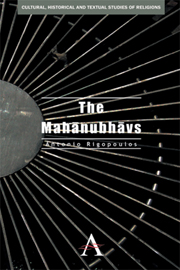Book contents
- Frontmatter
- Contents
- Dedication
- 1 Introduction
- 2 The Early Historical Background and the Mahānubhāvs' Foundational Texts
- 3 The Five Manifestations of the Supreme God Parameśvar
- 4 Elements of Mahānubhāv Doctrine
- 5 Mahānubhāvs' Practice: Devotion and Asceticism
- 6 Mahānubhāvs and Other Religions
- Bibliography
4 - Elements of Mahānubhāv Doctrine
Published online by Cambridge University Press: 05 May 2012
- Frontmatter
- Contents
- Dedication
- 1 Introduction
- 2 The Early Historical Background and the Mahānubhāvs' Foundational Texts
- 3 The Five Manifestations of the Supreme God Parameśvar
- 4 Elements of Mahānubhāv Doctrine
- 5 Mahānubhāvs' Practice: Devotion and Asceticism
- 6 Mahānubhāvs and Other Religions
- Bibliography
Summary
The Sūtra-pāṭh presents us with a fundamentally dualist (dvaita) system of thought. Cakradhar taught a radical distinction between individual souls and Parameśvar and preached a strict monotheism: in order to help jīvas attain salvation, Parameśvar manifests himself on earth as an avatār. In Mahānubhāv systematic, pluralistic doctrine —though it is not clear if this was also Cakradhar's point of view— there exist four separate and independent realities or substances (padārthas), thought to be beginningless (anādi) and eternal (ananta): a) Parameśvar, the One Supreme God beyond all deities, also called Dev, Īśvar, Para, or Śrī Prabhu; b) the many devatās, comprising the entire Hindū pantheon (with the exception of Kṛṣṇa and Dattātreya); c) the innumerable jīvas or individual souls; d) prapañca or the material world.
Despite the emphasis on the oneness of God, Parameśvar's nature is tripartite (Sītra-pāṭh 6.5): «being» or sat (= Brahman, said to be devoid of all properties); «consciousness» or cit (= Māyā, which has properties); and «joy» or ānanda (= Īśvar, which is both devoid of all properties as well as possessed of them). These immediately call to mind the three characteristics of the Vedāntic Brahman as sat-citānanda. Words are of course inadequate to express the mystery of the ‘three in one’, and Sūtra-pāṭh 11.12 states that «the tripartite (tri-aṃśa) one is nevertheless one in such a way that it cannot be divided».
- Type
- Chapter
- Information
- The Mahanubhavs , pp. 61 - 72Publisher: Anthem PressPrint publication year: 2011



